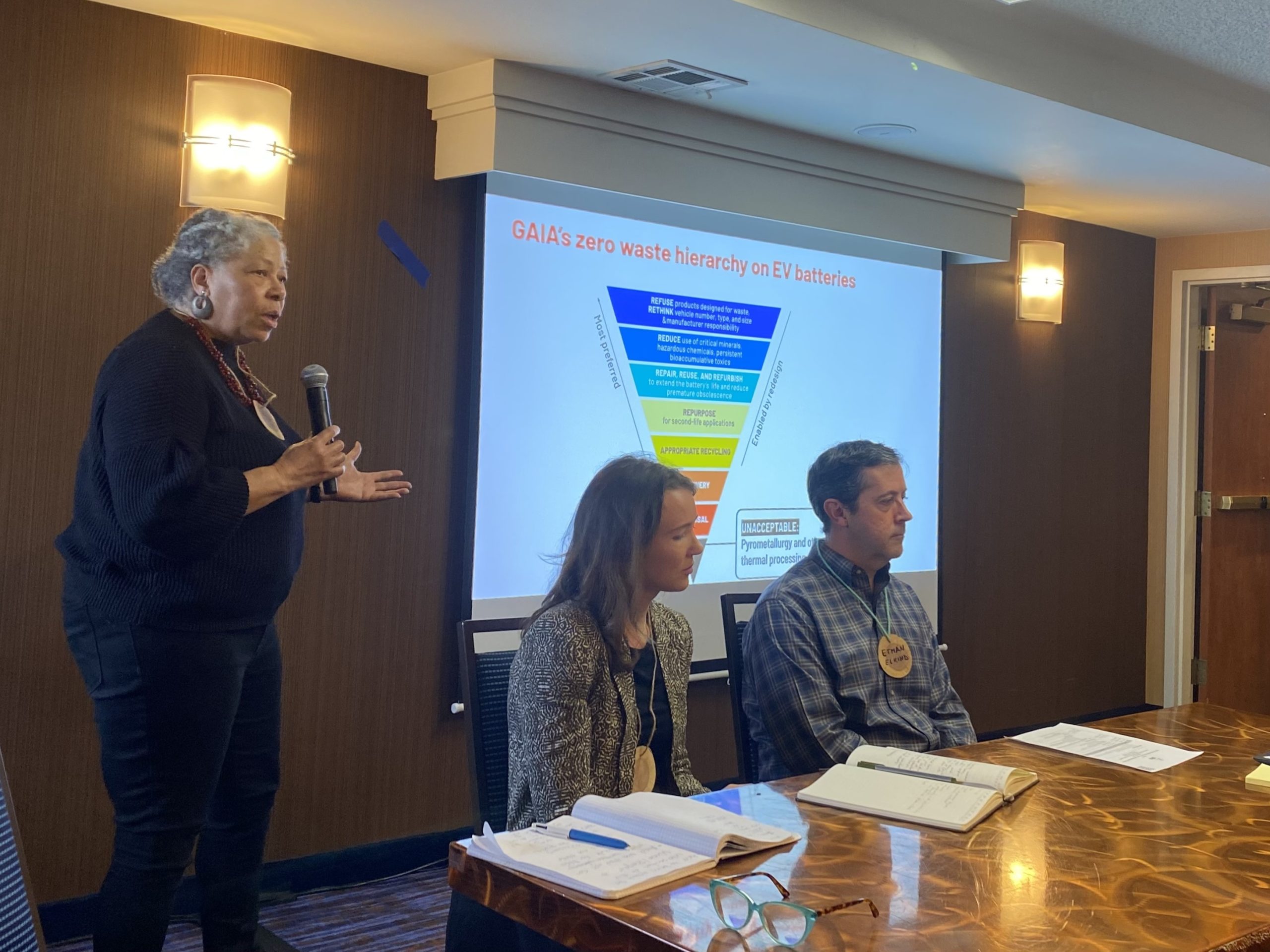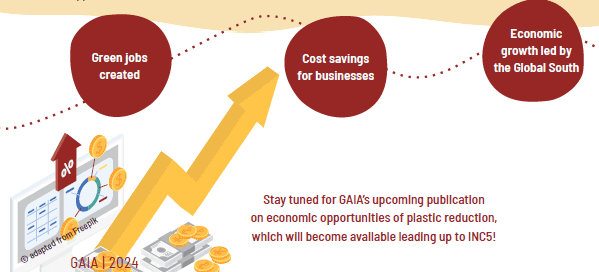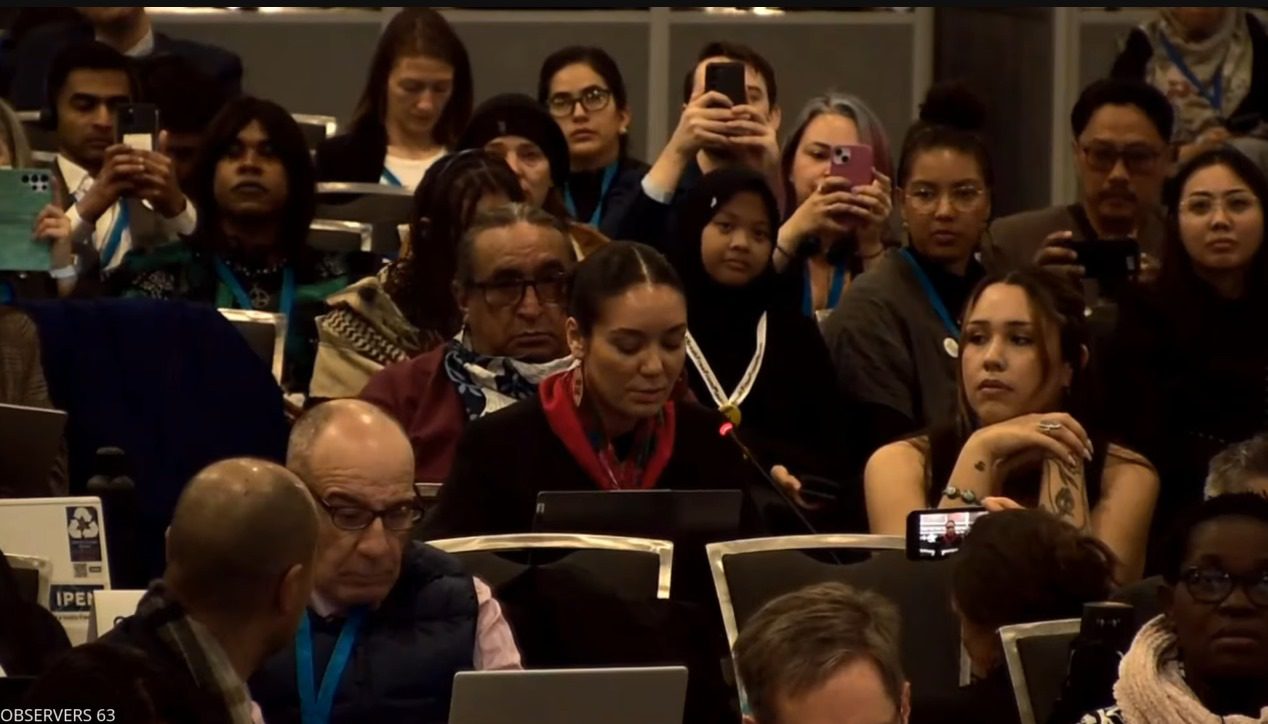INC-4 Day 2, April 24, 2024
Contact Groups continued to second day
Member States and Observers were in contact groups to continue to hammer out agreement on text. Contact group 1 is focused on parts I and II of the revised Zero Draft (the basis for treaty text), which cover the scope and objectives of the instrument, particularly how to address the life cycle of plastics. This is where the debate over plastic reduction (or what is being referred to as reduction of PPP– primary plastic polymers) is taking place.
Contact group 2 focuses on parts III and IV of the revised Zero Draft, which center around implementation. This is where discussions around financial mechanisms for the treaty are taking shape.
New study shows: more plastic production = more plastic pollution
(Courtesy of #BreakFreeFromPlastic)
A research paper published in Science Advances on April 24 confirms plastic production is directly linked to plastic pollution– such that every 1% increase in consumer goods companies’ plastic production is associated with a 1% increase in plastic pollution in the environment. The paper is the result of a five-year analysis conducted by scientists from a dozen different universities in the United States of America, Australia, the Philippines, New Zealand, Estonia, Chile, Sweden, Canada, and the United Kingdom.
The researchers used #BreakFreeFromPlastic (BFFP) brand audit data from 1,576 audit events across 84 countries gathered between 2018 – 2022. The data revealed that 56 global companies are responsible for more than half of all branded plastic pollution, with a quarter of the branded waste attributed to just five companies: The Coca-Cola Company, PepsiCo, Nestlé, Danone, and Altria/Philip Morris International. As world leaders negotiate a Global Plastics Treaty at INC-4, this research serves as a tool to support a high-ambition legally binding treaty that includes provisions on corporate accountability, prioritizing plastic production reduction measures, and promoting reuse and refill systems.
Fossil Fuel Lobbyists Outnumber National Delegations, Scientists, and Indigenous Peoples at Plastics Treaty Negotiations
Courtesy of Center for International Environmental Law (CIEL)
An analysis by CIEL in collaboration with GAIA and others finds:
- 196 lobbyists for the fossil fuel and chemical industry registered for the plastics treaty talks, a 37% increase from the 143 lobbyists registered at INC-3.
- Fossil fuel and chemical industry lobbyists outnumber the combined 180 representatives of the European Union delegations.
- The total number of fossil fuel and chemical industry lobbyists registered is three times greater than the 58 independent scientists from the Scientists’ Coalition for An Effective Plastic Treaty and seven times greater than the 28 representatives of the Indigenous Peoples Caucus.
- 16 lobbyists for the fossil fuel and chemical industry registered across nine different country delegations, including four in Malaysia, three in Thailand, two in Iran and the Dominican Republic, and one each in China, Kazakhstan, Kuwait, Turkey, and Uganda.
- The fossil fuel and chemical industry registered more representatives than the smallest 87 country delegations combined.
- The Pacific Small Island Developing States (PSIDS) collectively registered 73 representatives, meaning they are outnumbered more than two to one compared to the fossil fuel and chemical industry lobbyists.
Civil society soundbyte
Spokespeople from Aamjiwnaang First Nations, the Society of First Nations, and Keepers of the Water held a press conference at the Shaw Center to speak out against the systemic violence and environmental genocide that they’ve suffered at the hands of the Canadian government, focusing particularly on the use of ancestral lands for oil and gas extraction to make plastic. They also expressed their frustration at the limited access they’ve had to the treaty negotiations.
Excerpt from Ecojustice press release:
Last week Aamjiwnaang First Nation Chief and Council issued an alert to the community warning of high levels of benzene, a chemical used in the production of plastics that is known to cause cancer and increase respiratory illnesses. Concerningly, industry and the Ontario Ministry of the Environment, Conservation and Parks failed to inform the community about the elevated pollution levels through the public warning system.
Janelle Nahmabin, Elected Councillor, Aamjiwnaang First Nation said: “I’m willing to put my life on the line for the next generations. That’s how much I love my people and my land. What about you?”
Contact:
Claire Arkin, Global Communications Lead
claire@no-burn.org | +1 973 444 4869
References:
- Science Advances Study and press release
- Fossil fuel lobbyists exposed: press release
- Aamjiwnaang delegates press conference recording
- GAIA Asia Pacific Newsroom
For more information about GAIA’s treaty advocacy, please visit no-burn.org/unea-plastics-treaty, follow us on X @gaianoburn, and read our Press kit.




























